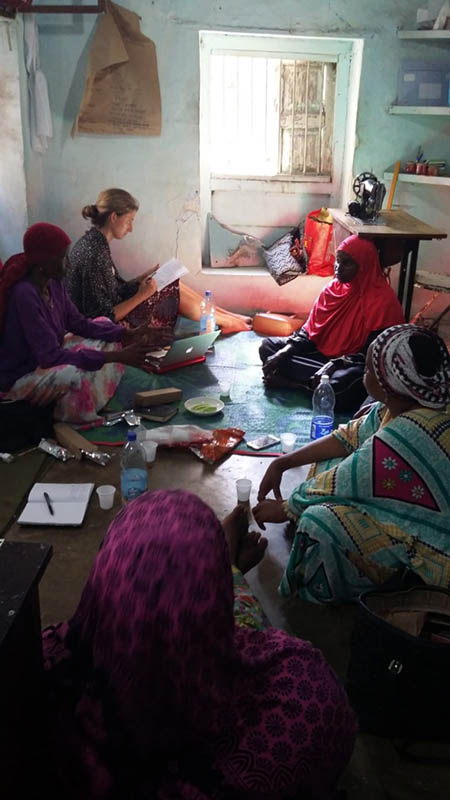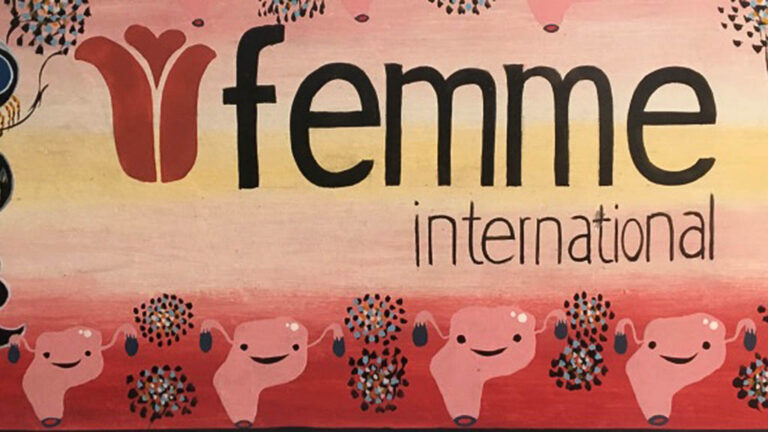Studying something in a place where the subject is associated with shame and silence is a challenge. For ten weeks I have studied menstruation as an obstacle to women's social participation. I have understood the meaning of a culture of silence and how prominent a stigma can be. Around the world, there is a noticeable stigma that every person with menstruation has probably felt at some point in their life. A stigma that silences women, girls and others with menstruation to share their stories and learn more about something so vital and important.
According to Marni Sommer, a researcher in global health, the culture of silence is due to the lack of quality-assured education and a lack of understanding that menstruating women and girls need a safe place in school to take care of their hygiene. Otherwise, girls and women remain absent for about three to four days a month. This is a major reason why non-profit organizations (NGOs) focus on making educational efforts in schools. They also want to fight the traditions and religious beliefs - that menstruation is something dirty and shameful - that are passed down from generation to generation.
I asked a number of women in a focus group I was holding if it would be socially acceptable to pick up a tampon or tie on the bus in Tanzania. The women first became quiet and nervous, then they laughed a little and asked me the same about Sweden. I got a food for thought, it is not completely socially accepted in Sweden either.
The biggest change that must take place for menstabut to be broken is that space is created for the female body to assert its own rights. Today, there is no room for the individual woman to take a seat and invoke her rights. There is often an outsider who should invoke them for her by directing the debate, not taking the context into account and above all not listening to the women's personal narratives about what it is like to grow up with menstruation. Part of the culture of silence is about menstruation being associated with shame, but another part is that women are not given space and the opportunity to choose for themselves what they should think and think about their menstruation.
Everyone should be involved
How can you then break the stigma around menstruation? The most prominent strategy is the involvement of "everyone" in the social movement - to educate and spread knowledge to everyone, regardless of whether they themselves menstruate. Involving "everyone" in a movement based on an issue that primarily affects women is difficult, especially for people who value traditions, religious beliefs or other cultural aspects higher than other values.
Many NGOs work mainly to meet children and young people in school, an environment where children meet daily and learn new things. The biggest resistance NGOs face in their work is negative and reverse reactions from parents and others. This may be due to religious, cultural and traditional beliefs about menstruation that are associated with shame, dirt and silence - and that that knowledge is stronger than the new one.
Girls should understand their rights
Challenging the stigma of creating equal and equal participation for women in society is another strategy for breaking the menstrual cycle. By girls themselves understanding their rights, they can challenge structures and traditions during their upbringing. This is based on the fact that women and girls themselves understand why the debate is important, and why there is a culture of silence. Menstruation should not stand in the way of girls' and women's social participation.
In recurring interviews, my respondents highlight how important it is to challenge a stigma, but that there needs to be an understanding of how, where and when. Many organizations are governed internationally from, among others, Europe and North America, which can lead to divided opinions as to whether there is an understanding of the context or not. Organizations need to be aware of the context in which they act, ie the environment, the groups involved and what their respective reality looks like. By starting from which perspectives are relevant to take into account in the work, the organizations can contribute in a sustainable and respectful way.
Good cooperation with the political government is required
A well-functioning collaboration with the political government in the country is extremely important for implementation and influence. NGOs have a mandate to influence the health and sexual rights agenda in Tanzania, but they also need to adhere to specific guidelines of the political regime. Good cooperation creates an equal distribution of resources, which in turn increases the possibility of implementing the agenda. At the moment, there are major difficulties for NGOs whose activities depend on the import of sanitary products such as sanitary napkins or menstrual cups. The Tanzanian State refuses to authorize imports. This creates difficulties for NGOs to continue their educational efforts and increase understanding of menstruation.

The women I met were active in organizations working to educate all individuals in society in sexual and reproductive health and rights (SRHR). By highlighting the women's personal stories about how tradition, religion and culture affect the stigma surrounding menstruation, the chance increases that the stories can form the basis for strategies and methods in the work with SRHR.
In Dar es Salaam, Tanzania's largest city, I met two employees from the magazine Femina Hip, who actively participate in the debate on women's rights to her own body. The magazine wants to address everyone in society and highlights sexual and reproductive health - and the stigma surrounding menstruation and pregnancy. It is an example of how NGOs can reach people all over Tanzania, through an informative and accessible magazine with reports from all perspectives of society. Additional approaches that NGOs use to reach the target group are program and educational initiatives in schools. These program and educational efforts are based on the fact that there is a great lack of knowledge about sexual and reproductive rights.
Taboos in all religions and ethnic groups
In Tanzania, there are different ethnic groups (tribes), and if you belong to a certain group, there are also special restrictions, traditions and requirements. In one of my interviews, the respondent tells how her upbringing in one of the larger ethnic groups was marked by lies, and how she one day decided to prove the opposite:
“In my tribe I was told that; 'you must not go out and pick vegetables in the garden! If you pick them, they will die! '. I just answered okay because I still had my period. The next time my period came I was home myself and so I said to myself; 'okay, let me go out in the garden and prove the opposite!'. I picked a number of vegetables and waited, but the vegetables that were going to die never died ”. (Translated quote from an interview with the organization Femme International in Moshi in northern Tanzania, which works actively to break the stigma around menstruation, 11 / 10–2018)
In addition to different ethnic groups in Tanzania, there are also major differences in beliefs and religious beliefs. Predominantly Christianity on the mainland and predominantly Islam on Zanzibar. However, this is not highlighted as a distinctive difference in how the stigma surrounding menstruation is perceived.
Society should not control a woman's own understanding of her menstruation. There is an opportunity to influence their own lives and their own choices, but women and girls must be given the opportunity to understand how and why. Today, many, including the respondent above, work actively to support other young women to stand up for their rights. They want to prove that it is not true that vegetables die if you pick them during your period, that you can certainly be close to your family and not have to hide from shame, and that you should not be teased at school because menstruation would be something dirty .


